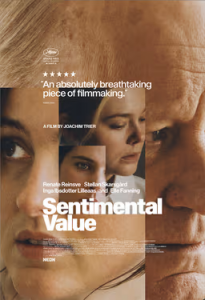
“Sentimental Value” (“Affeksjonsverdi”)
(Norway/Germany/Denmark/France/Sweden/UK/Turkey)
Metacritic (9/10), Letterboxd (4.5/5), Imdb.com (9/10), TMDB.com (9/10), Imdb.com critics review
#BrentMarchant #SentimentalValue #JoachimTrier #RenateReinsve #StellanSkarsgård #ElleFanning #familydiscord #agingfilmmaker #Norway #domesticdysfunction #legacyfilm #forgiveness #makingamends #adultdaughter
When a film has the capacity to provide a template for overcoming domestic discord, promoting forgiveness and helping to heal one’s past, it’s to be truly commended for going beyond being mere entertainment or even an admired artform. It aspires to become a noble, laudable cinematic godsend, one verging on providing a valuable service to those requiring much-needed guidance and direction in their lives. At the risk of exaggeration, such is the case with the latest offering from writer-director Joachim Trier, arguably the best work of his storied career. When aging, esteemed Scandinavian filmmaker Gustav Borg (Stellan Skarsgård) unexpectedly reconnects with the family from which he has long been estranged, his two adult daughters, Nora (Renate Reinsve) and Agnes (Inga Ibsdotter Lilleaas), are baffled by his sudden reentry into their lives. After years of conflict and incessant arguing with his wife, Gustav departed without warning, leaving his now-recently deceased spouse to raise their two daughters on her own. Despite the challenges associated with such circumstances, Nora would go on to become a successful, if troubled and lonely, stage actress, while Agnes went on to live a comparatively stable life as a wife and mother. Gustav, meanwhile, launched into a noteworthy filmmaking career, though, due to the onset of failing health and problem drinking, he hasn’t worked on a new project for some time. However, with his re-emergence into his daughters’ lives, he now hopes to change that – by making a movie that he views as a legacy production, a less-than-veiled autobiographical piece that he claims to have written for Nora and for which he would like her to play the lead. But, given the longstanding bitterness between Nora and her father, she turns him down, a major setback for his plans to proceed – that is, until Gustav meets a young American rising star, Rachel Kemp (Elle Fanning), to whom he offers the part. The director’s casting choice, in turn, unleashes a barrage of new emotional turmoil, some of which involves rehashing the past and other parts of which uncover new, previously concealed issues involving both Gustav and his daughters, as well as family members from his own past. At the same time, taking on the role of Gustav’s protagonist pushes Rachel to examine her role in this complex scenario, both for the development of her own career as an actress and how she fits into what is clearly a metaphorical vehicle for sorting out Borg family drama. As challenging as all of this can be for everyone involved, however, it also provides the players with an opportunity for healing, personal and professional growth, and a fresh start for the future. The question is, can they rise to the occasion? Filmmaker Trier thus embarks on a rather involved storyline (sometimes a little too involved for its own good), but the narrative nevertheless eagerly takes on the ambitious task of intertwining various aspects of art and life and how one might be drawn upon to address the challenges and opportunities of the other. While the picture might potentially be seen as a little overlong, the director manages to successfully cover considerable ground without belaboring his material or incorporating extraneous elements. Moreover, the deftly penned screenplay effectively keeps the picture from becoming too heavy-handed through the inclusion of strategically placed comic relief, including several delightfully witty nudges at a well-known Scandinavian furniture retailer. These assets are further enhanced by this release’s gorgeous, creative cinematography and the superb performances of its fine cast, particularly Reinsve, Skarsgård and Fanning, all of whom turn in decidedly award-worthy portrayals representing some of the best work of their respective careers. As the winner of the Grand Prize of the 2025 Cannes Film Festival and a nominee for the event’s Palme d’Or (the festival’s highest honor), “Sentimental Value” is yet another standout effort from this gifted Norwegian filmmaker, one very much in the same vein as – if not, arguably, even better than – his eminently praiseworthy previous offering, “The Worst Person in the World” (“Verdens verste menneske”) (2021). Keep an eye on this one as movie awards season unfolds.



